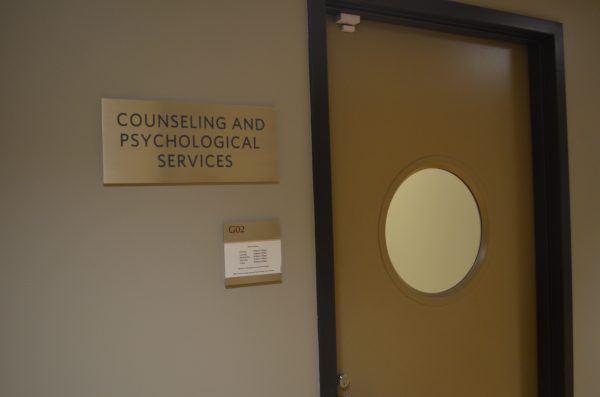CPS and RHA Aim to Diversify Mental Health on Campus

The Counseling & Psychological Services office is open Mondays – Thursdays from 9 a.m. – 7 p.m. and Fridays from 9 a.m. – 5 p.m. (ELIZABETH LANDRY/THE OBSERVER)
April 4, 2018
Counseling and Psychological Services (CPS) and the Resident Housing Association (RHA) are teaming up to address concerns about mental health services on the Fordham Lincoln Center campus, especially concerning minorities. The most significant change is the implementation of Real Talk, a series of student-led dialogues that hope to foster widespread conversation about mental health and ultimately bring more diversity to the CPS staff. The collaboration was spurred in mid-January by an administrative and student consensus on the visible lack of diversity concerning mental health services both on- and off-campus. Samuel Blackwood, RHA Advocacy Coordinator and Fordham College at Lincoln Center (FCLC) ‘19, launched the initiative after noting that media surrounding mental health was overwhelmingly “white-centric,” including CPS discourse at Fordham. Though CPS actively informs students about the danger of microaggressions, unintentional verbal or nonverbal cues that communicate derogatory messages to marginalized groups, its in-person counseling staff lacks any counselors of color. Jeffrey Ng, director of CPS, said that although minority groups experience agressions and stressors that “can make them more vulnerable to mental health distress and problems,” these same groups “under-utilize mental health services for various reasons,” including a lack of visible diversity in counselors, stigma surrounding mental health and mistrust and misinformation about mental health resources. In order to combat professional underrepresentation and encourage the inclusion of minority groups in mental health discourse, the RHA-CPS collaboration is installing a series of student-led discussions concerning minority experiences on campus. The program, called Real Talk, is organized by RHA, CPS and campus club Active Minds, and will be implemented early next year. Real Talk will focus on one topic a week and invite diverse members of a marginalized group with different identities and different backgrounds to share their experiences in a round-table discussion open to the public. Lauriann Kormylo, FCLC 18 and Co-Founder/Vice President of Active Minds, said Real Talk is “looking to make a continued space on campus where the conversation about mental health is explicitly inclusive of all student experiences.” While racial diversity inspired the program, Real Talk will also dedicate sessions to movements such as LGBTQ+ struggles and women’s rights. The program will rally minority clubs on campus, such as Rainbow Alliance or Black Student Alliance, to facilitate these discussions. Active Minds President Alexandra Rebosura, FCLC 18, hopes these talks will “not only connect students with similar experiences, but also provide a space for others to understand experiences unlike their own,” allowing listeners to simultaneously find a community and reflect on their own privilege. The student-led discussions aim to facilitate dialogue where minority students otherwise felt unsafe seeking help. “Students leading these conversations opens the space up, and makes it feel more like an actual conversation, rather than a class or a therapy session,” said Kormylo. “If a student is struggling with their mental health, but doesn’t know how to talk about it or who to talk about it to, it can be infinitely helpful to see another student being open, vulnerable and honest about their own mental health.” The emphasis on student involvement also seeks to incite engagement in Real Talk discussions and encourage student interest in its success. Real Talk is the first step in a series of reforms that aim to make professional mental health services easily accessible by Fordham’s student population. The RHA-CPS collaboration hopes to establish topical counselor-led student group discussions as a follow-up to Real Talk sessions. This intermediary step will allow students to benefit from Fordham’s current professionally trained CPS staff while still sharing their personal experiences. The ultimate goal of the collaboration is to create visible diversity among Fordham Lincoln Center’s mental health services. Ideally, organizers hope Real Talk’s success will incite administration to hire counselors of color and other underrepresented groups. Ng said the community-based approach will “contribute to increasing marginalized students’ sense of trust and safety towards CPS and other mental health resources on campus.” Members of Active Minds also see Real Talk as way to open doors in off-campus de-stigmatization of mental health. By inviting marginalized students to speak freely about their experiences with mental health, especially in relation to various aspects of their identity, Kormylo and Rebosura hope to normalize its discussion and build networks of support. “Not everyone has a mental illness,” Rebosura said, “but everyone has mental health.”









